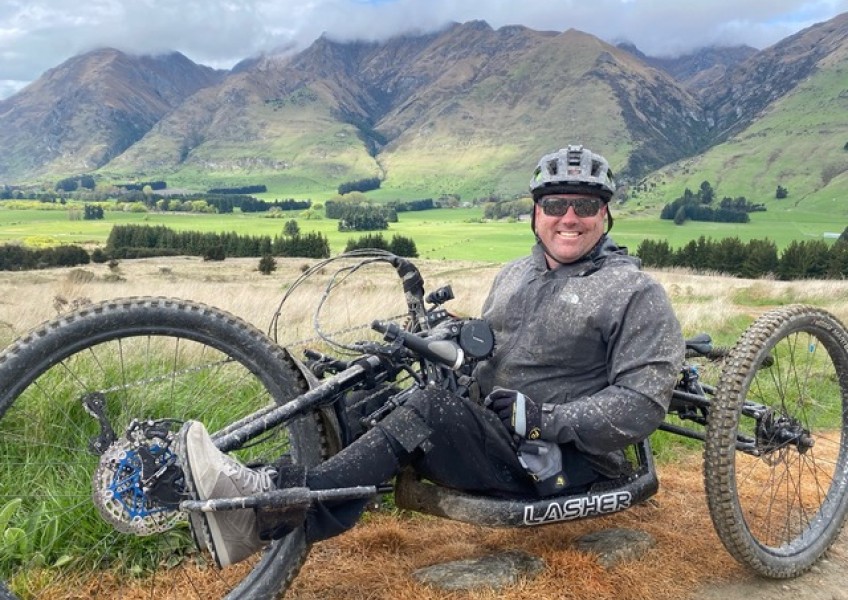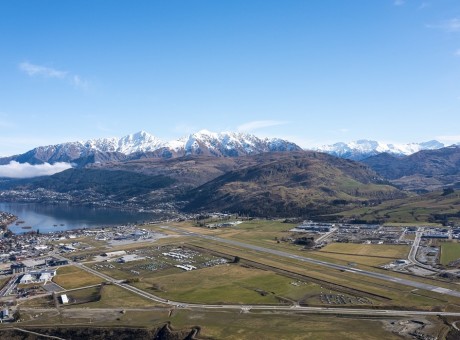Deputy mayor Quentin Smith on the need for a change in QLDC culture


Experience could be QLDC Deputy Mayor, Quentin Smith’s, middle name. He has decided to run for a fourth term on the council despite finding this term very challenging.
“It's been a really hard term, this term, but I think I’ve demonstrated that I'm well informed and have engaged well with the community. I’ll continue to do so and will fight for the ratepayers of this district to get the things we need. I think we've got a tough road ahead, and we need some experience at the table, and I believe I represent that.”
The reasons for this challenging term will be of no mystery to those who keep abreast of events in both national and regional news coverage.
So, in the Deputy Mayor’s opinion, what made this current term difficult?
“There's a range of reasons. We've had a couple of really tricky, big issues put in front of us. It started, probably, with the leaky homes claim and, as a result, we had to settle a claim for well over $100 million. That was at the beginning of this term and that's had a massive impact on everything we have done since then, from a financial perspective, and it will continue to do so.”
The leaky home claim won’t be the only reason ratepayers are smarting over some of QLDC’s financial outcomes.
“We've had to deal with three versions of Three Waters reform. We've had challenges, obviously, regarding the Alliance and the Arterial project in the Queenstown town centre, which has been very controversial. And ongoing challenges with Lakeview and the Project Shotover wastewater. There's been four, four or five, very high profile problematic issues for council, and that's made it difficult.”
In Crux’s estimation, over the last seven years or so, the ballpark figure of between $300 and $400 million have gone in the “dumb decisions box”. which is, no doubt, unhelpful when it comes to the ever-increasing rise in rates. In Quentin Smith’s patch, Wānaka-Upper Clutha, the latest rate rise is 18%.
How aware is Smith of the impact rate increases have on his constituents and what does he have to say to them?
“I'm one of those ratepayers, and I'm absolutely struggling with the additional rates. In my case, it's about $1,000, a year, extra this year. And you know, it's fundamentally unsustainable. A lot of that is, in part, borne by the leaky homes claim. That has had a big bearing on all our rates increases, particularly over these couple of years, as well as the high cost of growth-related infrastructure.”
As Smith says, this has forced QLDC’s hand, restricting Council’s operations.
“We have stripped out our program to the absolute bare minimums, and we're still receiving high rates increases. I think this represents, particularly for high-growth Councils, that relying on rates alone is an unsustainable model.”
Trust in Council is also on Smith’s mind. A recent survey revealed the community’s confidence in Council is at a mere 18%. A level, Smith says, is unacceptable.
“The trust and confidence survey that was done, clearly demonstrates the community doesn't have a high level of trust in the Council at the moment, and that's something that is absolutely critically important to deal with now.”
Was he surprised by the poor result?
“I'm not surprised, because I think that the way we engage, and communicate, with the public hasn't been particularly good. And, you know, there have been a number of situations which have undermined trust with the community. So no, I'm not surprised. I'm disappointed that that has occurred, and I fought very hard, in most cases, to support our community for the right outcomes. But, yeah, I think we clearly are doing some stuff wrong that is undermining trust.”
“I think not just the way, but the tone in which we engage with our community is wrong. We need to be informing, not spinning information. We need to change that completely.”
“We need to be open and honest and focus on rebuilding trust in the community. Trust in government, and local government, right across the country, is down so there is a much broader issue at play as well, but we are at the bottom of the stack.
We need to elect people who they trust, and I hope that I'm one of those, because I have acted with integrity, and acted and engaged strongly with the community over time, but they need to elect people who they trust, and need to hold them to account, and continue to put pressure on them to be more and more open and more transparent.”
The change of Government during Smith’s third term has also impacted on QLDC’s operations. He is in no doubt initiatives driven by Central Government come at a cost for ratepayers.
“I think they're blindly driving growth without dealing with the infrastructure question. We simply cannot afford the costs of the infrastructure required for the growth that we're receiving.”
Smith is very clear ratepayers can’t continue to incur the increasing costs associated with Central Government’s drive for growth, and the subsequent increased pressure on infrastructure. So what does he suggest we do?
“There's a bunch of mechanisms we continue to fight for regarding revenue.
Alternative revenue for infrastructure could come from a Visitor Levy, a more user-pays approach.”
“The Visitor Levy has been well documented. We had a referendum in our district which had 80% plus support for a Visitor Levy yet Government’s continued not to enable that. It could result in 20 or 30 or million dollars a year to support infrastructure.”
“The Regional Deal does provide opportunity for other revenue streams, including the Visitor Levy, and Government is looking at reform to the Development Levies program, and that's something that we continue to look at, make submissions on, to ensure that that is fit for purpose for our district.”
He also thinks developers and private investment could relieve ratepayers of some of the financial burden.
“Greater recovery of development contribution and alternative delivery models like Public Private Partnerships (PPP). We simply can’t continue to squeeze any more juice out of the same people, the ratepayers.”
Smith is clearly in favour of evidenced-based decision making and, as he says, the ‘devil is in the detail’.
The Regional Deal is a tricky piece, because it provides a great opportunity, but it provides a massive risk that decisions are made outside of normal planning processes. I'll use the gondola as an example. While a gondola as a rapid transport solution in Queenstown may be a great solution, the reality is we have absolutely no idea, at this point, whether it could deliver the transport benefits, what the operation model looks like, and who's funding it. So there are a lot of questions that remain unanswered. Both NZTA Regional Council and QLDC have no technical information, as far as I'm aware, that would demonstrate that the transport benefits exist for such a project.”
In the coming term, how much influence does Smith think Central Government will have?
“I do think the Government is definitely moving away from local decision making, whether it be Three Waters, Fast Tracks, or the RMA reform, and moving towards national standards and sort of top-down policy making. I have really worked very hard in this district to act strategically in terms of the District Plan and the Spatial Planning and things like that.
The Special Housing Areas, and now the Fast Track consenting bill, do undermine our ability to plan and develop strategically. We should be empowered to plan through things like the Spatial Plan and to make decisions on that basis. Fast Track consenting just removes that away from us completely and puts a massive obligation on Council to pick up the pieces in terms of delivering infrastructure.”
And, it appears, Smith is prepared to vote against initiatives if he thinks they’re not in ratepayers interests.
“Council, although I didn't agree with it, have decided to separate Three Waters into a CCO, which means that half our capital program will be removed from Council over the next three years. Ratepayers will pay for that in a different way through the CCO, but in terms of the work Council does, that will be completely put to one side.”
“The signal is that the cost of achieving the Government's reforms will basically require that ratepayers will pay whatever is required to achieve the standards of Three Waters. Whatever that cost is will be put on the ratepayers.”
Council will be facing further challenges driven by Central Government.
“We have a complete change of the RMA coming, and lots of other challenges around how Government see local government working. I think they're the biggest challenges for the coming term. What does local government look like in three years from now? What does our Council look like in three years from now and the direction we're heading. It could look very, very different.”
It sounds like there are ‘choppy waters’ ahead for QLDC so, if re-elected, how does Smith envisage dealing with this?
“We’re facing a really tough time ahead, particularly because of the Government reforms. I think we need to focus on developing a culture within Council that is collegial, and consensus making, and we need to be strong in sticking up for what our residents need in this district. We need to be less focused on what the visitors, and the future residents, necessarily need, and focused on making sure that our existing residents are well looked after.”
Does Smith think Council has the expertise, and processes in place, to oversee developments successfully?
“It depends. Council successfully deliver the bulk of a massive capital program from underground infrastructure to sport and rec buildings but I don’t think Lakeview, or the Alliance, have been successful in my opinion. I think Council should steer clear of speculative commercial projects and things like conference centres. I also think we need to look at how a complex and expensive bridge project like the Edith Cavel replacement crossing is managed - and council don’t deliver a lot of bridges.”
The position of QLCD Chief Executive becomes vacant during the coming term. Councillors will appoint a replacement. How much significance does Smith place on the replacement of Chief Executive?
“One of the most important jobs that Councillors do is appoint the Chief Executive and to set appropriate KPIs (Key Performance Indicators) of the Chief Executive. The appointment does provide an opportunity for the new Council to select someone who they think represents the qualities our community is looking for and that provides an opportunity for a shift in culture, and someone who will bring some new ideas to the table that help us deal with the issues.
What are those qualities he’ll be looking for?
“Firstly, we need someone who's got appropriate experience. That goes without saying. Secondly, I'd love to see someone who is going to garner trust and confidence from the community, and someone who is visible, and someone who's prepared to own the positive and the negatives, the ups and downs of Council.”
No doubt, as Deputy Mayor, Smith has been engaged in much of QLDC’s business this term but how well does he think he’s served his patch, Wānaka – Upper Clutha, this term?
“I think that my record stands, not over this term, but over three terms, I think. And I've continued to be a strong advocate for particularly the Upper Clutha community. While there have been challenges this term, I am really proud of some of the things that we've achieved. We took over the ownership of Mount Iron, which was something I was very closely involved with and that's something I'm incredibly proud of.
“I initiated the discussion and the opportunity to buy Mount Iron for the community, and I think that's something that will endure for a long time as a benefit to the Wanaka community and the district.”
“We have achieved a lot in terms of capital delivery too. There are projects like the pathway adjacent to the Wanaka Marina, the roundabouts at Lake Hawea dam, and Riverbank Road extensions to the active travel network in the Upper Clutha, and a major upgrade to Project Pure, the sewage scheme in Wanaka.”
“And we're just starting the delivery now of the biggest capital project Council's ever done, which is the Upper Clutha wastewater conveyancing, which includes the pipeline from Lake Hawea.”
Given there’s been huge population growth over the last decade, does Smith think the infrastructure is coping?
“The short answer is no in that there is a deficit in infrastructure, and there's no question of that. We are well behind on transport infrastructure, and we are struggling to keep up with water and wastewater.”
“That's evident in a number of different ways. Traffic congestion, the restrictions on water over the summer at various times. We've been very close to capacity on Project Pure as well. But we are, in many cases, in a better position than in Queenstown. We don't have the challenges of Project Shotover in Wanaka. We are making some major investments to keep on top of the wastewater issues, which is great to see.
I’m very fearful of transport infrastructure. Particularly, the Albert Town bridge is a key example of that. Within five years we're effectively seeing that reach its capacity.”
And one final question for the Deputy Mayor.
NIMBYISM. Does he think this is a conveniently weaponised criticism to silence those who want to protect their landscape from the ravages of growth?
“As you say, it has been weaponised.”
“And the Government use it regularly, which I think is really disappointing, because what they hear is we don't want development. That isn't the case. You know, we accept that the people want to come here, and that we have to provide for growth.
“But what they don't realize is, it's the infrastructure that is causing the pain. If the roads were working fine, then people wouldn't be worried about the growth, but when their trip to work takes twice as long as it did three years ago they see growth as the enemy, rightfully, because we haven't provided the infrastructure to accommodate that.
“It'd be nice to freeze in time, and for Wanaka and Queenstown to be the same as they were in the past, but I don't think we have that luxury, but we do have the responsibility to make sure that the infrastructure keeps up.”
























